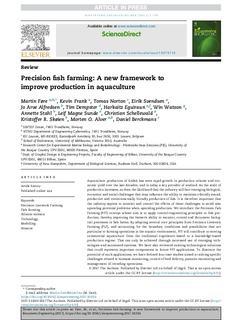Precision fish farming: A new framework to improve production in aquaculture
Føre, Martin; Frank, Kevin; Norton, Tomas; Svendsen, Eirik; Alfredsen, Jo Arve; Dempster, Timothy David; Eguiraun, Harkaitz; Watson, Win; Stahl, Annette; Sunde, Leif Magne; Schellewald, Christian; Skøien, Kristoffer Rist; Alver, Morten; Berckmans, Daniel
Journal article, Peer reviewed
Published version
Permanent lenke
http://hdl.handle.net/11250/2468861Utgivelsesdato
2017-11-14Metadata
Vis full innførselSamlinger
- Publikasjoner fra CRIStin - SINTEF Ocean [1386]
- SINTEF Ocean [1460]
Originalversjon
10.1016/j.biosystemseng.2017.10.014Sammendrag
Aquaculture production of finfish has seen rapid growth in production volume and economic yield over the last decades, and is today a key provider of seafood. As the scale of production increases, so does the likelihood that the industry will face emerging biological, economic and social challenges that may influence the ability to maintain ethically sound, productive and environmentally friendly production of fish. It is therefore important that the industry aspires to monitor and control the effects of these challenges to avoid also upscaling potential problems when upscaling production. We introduce the Precision Fish Farming (PFF) concept whose aim is to apply control-engineering principles to fish production, thereby improving the farmer's ability to monitor, control and document biological processes in fish farms. By adapting several core principles from Precision Livestock Farming (PLF), and accounting for the boundary conditions and possibilities that are particular to farming operations in the aquatic environment, PFF will contribute to moving commercial aquaculture from the traditional experience-based to a knowledge-based production regime. This can only be achieved through increased use of emerging technologies and automated systems. We have also reviewed existing technological solutions that could represent important components in future PFF applications. To illustrate the potential of such applications, we have defined four case studies aimed at solving specific challenges related to biomass monitoring, control of feed delivery, parasite monitoring and management of crowding operations.

